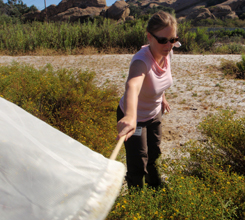 |
FIELD RESEARCH -
POLLINATOR SCIENCE
Honey bees and native bees in forest ecosystems:
What is the best management practice for pollination services on production forest landscapes? How do pollinators impact wildlife food availability in these managed landscapes? And most importantly, how are honey bees and native bees interacting on this landscape? Pollinator Partnership (P2) is conducting field research in production timberlands in Southern Mississippi to understand how the pollinators in this unique system interact with local land use.
Managing native bees with food and housing near heirloom agriculture:
Pollinators need food and shelter to survive and thrive. P2 is working with a local partner, Native Seeds SEARCH, to study how pollinator populations can increase with food plantings and nest site provisioning and how this might improve local seed production. If more nest sites are available will you get more bees, and more importantly, a yield increase? Understanding how pollinators can be managed to increase agricultural productivity is important for sustainable farming. |
 P2 scientist sampling pollinators visiting the locally threatened Santa Susana Tar Plant in Canoga Park, Los Angeles P2 scientist sampling pollinators visiting the locally threatened Santa Susana Tar Plant in Canoga Park, Los Angeles
|
